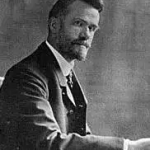In his recent Zero to One, Peter Thiel sets out a neat typology of philosophy, politics, and cultural attitudes based on differing stances toward the future. He distinguishes optimists and pessimists, and subdivides each into “definite” and “indefinite.”
Optimists and pessimists are obvious: One is bullish about the future, the other ursine. The interest of the typology is in the other distinction: Definites think they have some capacity to control the future, Indefinites don’t. So, a definite optimist plans and works in the expectation that he can predict the future and affect outcomes positively; definite pessimists think the future is bleak, but also believe they can take cunning steps to protect themselves from the worst of what’s ahead. Indefinite pessimists have the worst of both worlds: They don’t know what’s coming, and they can’t do anything about it anyway.
Thiel claims that much of contemporary America is dominated by indefinites, who believe that chance is more important than the old Algeresque virtues of planning, hard work, and perseverance. Much of our indefinitism is cheery: Progress is our inevitable future, and it will come no matter what we do now. Malcolm Gladwell’s analysis of success is a case in point: “When Baby Boomers grow up and write books to explain why one or another individual is successful, they point to the power of a particular individual’s context as determined by chance. But they miss the even bigger social context for their own preferred explanations: a whole generation learned from childhood to overrate the power of chance and underrate the importance of planning. Gladwell at first appears to be making a contrarian critique of the myth of the self-made businessman, but actually his own account encapsulates the conventional view of a generation.”
He sees the dominance of indefiniteness in the exhaustion of government, its retreat into being an insurance provider: “The government used to be able to coordinate complex solutions to problems like atomic weaponry and lunar exploration. But today, after 40 years of indefinite creep, the government mainly just provides insurance; our solutions to big problems are Medicare, Social Security, and a dizzying array of other transfer payment programs. It’s no surprise that entitlement spending has eclipsed discretionary spending every year since 1975. To increase discretionary spending we’d need definite plans to solve specific problems. But according to the indefinite logic of entitlement spending, we can make things better just by sending out more checks.”
And he sees the apparent battles between left and right as intramural skirmishes between different sorts of indefinites. Rawls and Nozick look to be “stark opposites,” but what they share is more fundamental than their differences: “Rawls and Nozick were indefinite optimists: they didn’t have any specific vision of the future.” Their indefiniteness, of course, was different: “Rawls begins A Theory of Justice with the famous ‘veil of ignorance’: fair political reasoning is supposed to be impossible for anyone with knowledge of the world as it concretely exists. Instead of trying to change our actual world of unique people and real technologies, Rawls fantasized about an ‘inherently stable’ society with lots of fairness but little dynamism. Nozick opposed Rawls’s ‘patterned’ concept of justice. To Nozick, any voluntary exchange must be allowed, and no social pattern could be noble enough to justify maintenance by coercion. He didn’t have any more concrete ideas about the good society than Rawls: both of them focused on process. Today, we exaggerate the differences between left-liberal egalitarianism and libertarian individualism because almost everyone shares their common indefinite attitude.” Without a definite vision of social good, they reduced justice to ensuring that the procedures were fair and everyone kept the rules.
It’s a neat, illuminating theory, and focuses attention where it ought to be focused. In theological terms, Thiel reminds us: “It’s the eschatology, stupid.”











